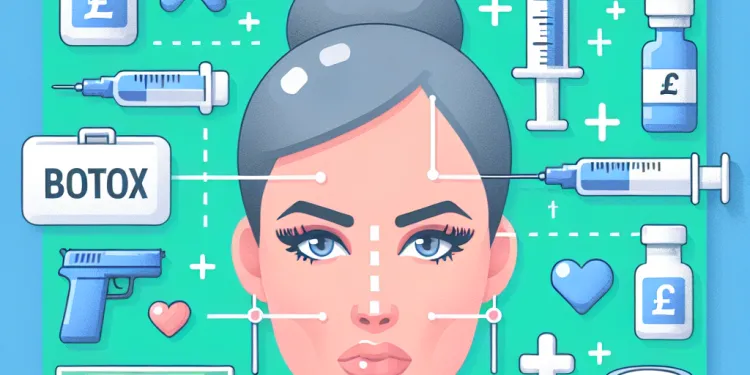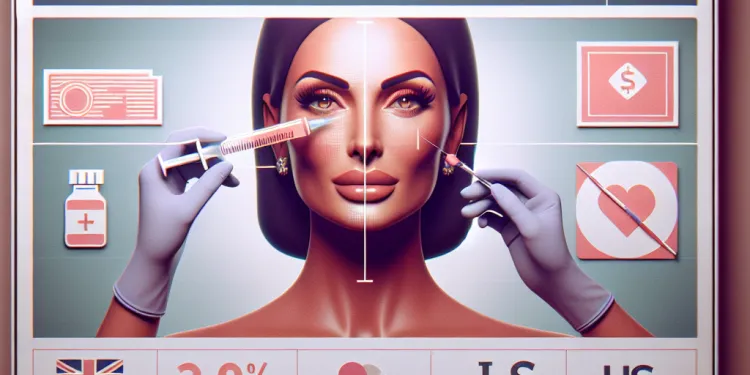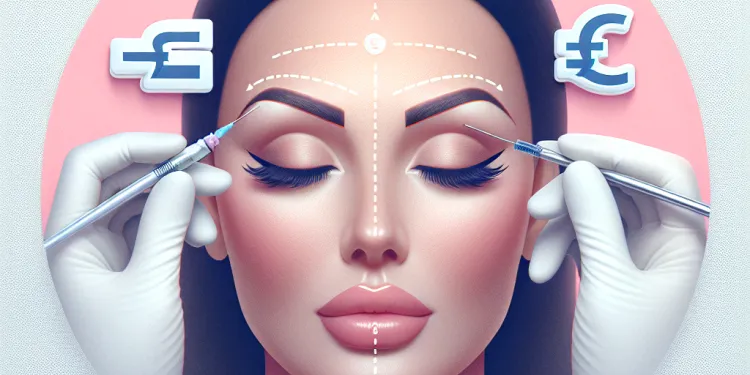
Find Help
More Items From Ergsy search
-

Can Botox cause serious health issues?
Relevance: 100%
-

Is Botox safe?
Relevance: 49%
-

What is Botox?
Relevance: 49%
-

Is Botox safe?
Relevance: 48%
-

Can I get Botulism from Botox Treatments?
Relevance: 47%
-

Is Botox vegan?
Relevance: 46%
-

How does Botox work?
Relevance: 45%
-

Can I get Botox while pregnant?
Relevance: 44%
-

Are there any long-term effects of using Botox?
Relevance: 44%
-

What is Botox used for?
Relevance: 44%
-

Can Botox be used for migraines?
Relevance: 44%
-

What are the common uses of Botox?
Relevance: 43%
-

Can anyone get Botox treatments?
Relevance: 43%
-

Is Botox treatment expensive?
Relevance: 43%
-

What are the side effects of Botox?
Relevance: 43%
-

Does Botox hurt?
Relevance: 43%
-

What areas can be treated with Botox?
Relevance: 42%
-

What is Botox made from?
Relevance: 42%
-

Who can administer Botox?
Relevance: 42%
-

Can Botox lift my eyebrows?
Relevance: 42%
-

Can Botox help with excessive sweating?
Relevance: 42%
-

What are the side effects of Botox?
Relevance: 42%
-

How long do the effects of Botox last?
Relevance: 41%
-

Does Botox injection hurt?
Relevance: 41%
-

How long does Botox last?
Relevance: 40%
-

How much does Botox cost?
Relevance: 40%
-

How does Botox work if it's related to botulism toxin?
Relevance: 40%
-

How should I choose a provider for Botox treatments?
Relevance: 40%
-

How soon will I see results from Botox?
Relevance: 39%
-

How should I prepare for a Botox appointment?
Relevance: 39%
-

How often should I get Botox treatments?
Relevance: 39%
-

How long has Botox been used in medicine?
Relevance: 38%
-

Can concussions lead to mental health issues?
Relevance: 38%
-

What should I do if I experience side effects after a Botox injection?
Relevance: 38%
-

Can Botox be used for treating conditions other than wrinkles?
Relevance: 38%
-

What precautions should I take before getting Botox?
Relevance: 38%
-

Can measles be serious?
Relevance: 36%
-

Is whiplash a serious injury?
Relevance: 35%
-

Health Officials Warn Against 'DIY' Health Remedies Amid Supply Chain Issues
Relevance: 34%
-

Is BPH a serious condition?
Relevance: 34%
Understanding Botox
Botox, scientifically known as botulinum toxin, is a neurotoxic protein that, in small doses, is used for cosmetic and medical purposes. It is primarily known for its ability to reduce the appearance of facial wrinkles. In addition, Botox is utilized in treating several medical conditions including chronic migraines, excessive sweating (hyperhidrosis), and muscle spasticity. Despite its widespread use and popularity, ongoing discussions concern the potential health risks associated with Botox, particularly when administered improperly.
Potential Risks and Side Effects
Like any medical procedure, Botox carries the possibility of side effects. Common minor side effects include pain, swelling, or bruising at the injection site, headache, and flu-like symptoms. More concerning are the less common, yet serious, side effects which can occur if the toxin spreads to other parts of the body. These include muscle weakness, vision problems, difficulty speaking or swallowing, and breathing difficulties. While these outcomes are rare, they underscore the need for Botox to be administered by a qualified healthcare professional.
Regulation and Safety in the UK
In the United Kingdom, Botox treatments must be carried out by registered and certified practitioners who have undergone specific training. The Medicines and Healthcare products Regulatory Agency (MHRA) regulates its use, ensuring that practitioners fully comply with safety protocols. Despite stringent regulations, there have been concerns about unregulated practices and non-medically trained individuals offering Botox injections. These unregulated procedures increase the risk of complications, highlighting the importance of choosing credible, licensed providers.
Cases of Serious Health Issues
While rare, there have been reports of serious health issues stemming from Botox use. The most significant risks associated with Botox involve incorrect administration and dosage. In rare instances, improper injection can cause botulinum toxin to affect unintended areas, potentially leading to botulism-like symptoms. Botulism itself is a condition that can lead to muscle paralysis and is considered a medical emergency. Therefore, ensuring that treatment is done by a skilled professional is paramount to mitigating these risks.
Considerations and Recommendations
For individuals considering Botox, especially for the first time, it is crucial to consult with a qualified healthcare provider. They should discuss all potential risks and benefits tailored to their specific health conditions. Confirming the qualifications and reputation of the clinic or professional is also advisable. Additionally, patients should adhere strictly to all pre- and post-treatment guidance provided by their healthcare provider to minimize the risks of complications.
Conclusion
Botox is a well-established treatment with both cosmetic and therapeutic applications. However, potential risks do exist, emphasizing the importance of professional medical consultation and adherence to safe practice standards. By choosing trained and licensed healthcare practitioners, individuals can effectively reduce the likelihood of experiencing serious health issues related to Botox administration.
Understanding Botox
Botox is a special medicine that helps to make wrinkles on the face less visible. It can also help with health problems like constant headaches, too much sweating, and muscle issues. But, if not used correctly, Botox can be risky for your health.
Potential Risks and Side Effects
When you get Botox, there might be some side effects. These can include pain, swelling, or bruising where you got the shot, or you might get a headache or feel like you have the flu. Sometimes, Botox can cause serious problems if it spreads to other parts of your body. This can make your muscles weak, mess up your vision, or make it hard to talk or breathe. It's rare, but this is why a doctor should always give Botox.
Regulation and Safety in the UK
In the UK, only trained and certified people are allowed to give Botox. The Medicines and Healthcare products Regulatory Agency (MHRA) makes sure that Botox is used safely. But, there are sometimes people who are not trained properly who give Botox shots, and this can be dangerous. Always make sure your Botox doctor is qualified and trusted.
Cases of Serious Health Issues
There have been some serious health problems from Botox, but they are rare. The biggest risks come from Botox being given the wrong way or in the wrong amount. If that happens, it can lead to serious issues like a condition called botulism, which makes muscles very weak. This is why it's super important that a professional gives you Botox.
Considerations and Recommendations
If you are thinking about getting Botox, especially for the first time, talk to a doctor you trust. They should explain all the good and bad things about Botox for your health. Make sure the place or person giving it is known to be safe and qualified. Follow all the doctor's advice before and after getting Botox to stay safe.
Conclusion
Botox is a popular way to help with wrinkles and some health issues. But, there can be risks, so always talk to a doctor first and make sure they are trained well. This helps you stay safe and enjoy the benefits of Botox.
Frequently Asked Questions
Can Botox cause severe allergic reactions?
Yes, in rare cases Botox can cause severe allergic reactions including rash, itching, or swelling, mainly in people allergic to botulinum toxin.
Are breathing difficulties a potential side effect of Botox?
Yes, breathing difficulties can occur if the Botox spreads beyond the injected area, especially if injected near the neck or throat.
Can Botox lead to swallowing problems?
Yes, if Botox spreads, it can affect muscles involved in swallowing, leading to difficulties in swallowing.
Is there a risk of vision problems from Botox?
Yes, Botox can sometimes cause blurred vision, drooping eyelids, or dry eyes as potential side effects.
Can Botox cause muscle weakness?
Yes, Botox can cause muscle weakness near the injected area or in severe cases, generalized muscle weakness.
Are there reports of Botox leading to botulism?
Botox contains a small amount of botulinum toxin, and while it's rare, improper usage can potentially lead to botulism-like symptoms.
Can Botox injections cause infection?
Though rare, any injection carries a risk of infection if not done under proper sterile conditions.
Is cardiac arrest a possible result from Botox?
Cardiac issues are extremely rare but could occur if the patient has pre-existing conditions or allergies.
Can Botox lead to speech issues?
Yes, if the injection affects muscles related to speech, temporary speech issues could arise.
Can Botox affect the central nervous system?
Botox does not typically affect the central nervous system but can affect peripheral nerve impulses.
Is nausea a side effect of Botox?
Some patients may experience nausea post-injection, but it's generally mild.
Is it possible for Botox to cause anxiety or nervousness?
Such psychological effects are not common but can occur, especially if the patient is apprehensive about injections or side effects.
Can Botox injections trigger headaches?
Botox can sometimes cause headaches, although it is also a treatment for chronic migraine.
Are there gastrointestinal problems associated with Botox?
Though uncommon, some patients might experience stomach upset or indigestion post-treatment.
Can Botox cause long-term side effects?
Long-term side effects are rare, particularly if treatment is administered by a qualified professional.
Is temporary bruising from Botox considered serious?
Bruising is a common minor side effect and not considered serious.
Do people with neuromuscular disorders face greater risks from Botox?
Yes, individuals with neuromuscular disorders may experience increased risk of serious side effects.
Can Botox affect the skin?
Skin reactions at the injection site, such as redness or irritation, can occur but usually resolve quickly.
Might Botox influence mental health conditions?
Botox doesn't directly affect mental health but consider consulting a mental health professional along with the treatment.
Are there any cardiovascular side effects from Botox?
Cardiovascular side effects are extremely rare but could occur if Botox enters the bloodstream in significant amounts.
Can Botox cause bad allergies?
Yes, sometimes Botox can make you very sick. It can cause a rash, make you itchy, or make you swollen. This happens mostly to people who are allergic to something called botulinum toxin.
Can Botox make it hard to breathe?
Yes, Botox can cause breathing problems if it moves to other parts of the body. This can happen if it is injected near the neck or throat.
If you have trouble reading, try to:
- Read slowly, one sentence at a time.
- Ask someone to read with you.
- Use a finger or a ruler to follow the words.
Can Botox cause trouble with swallowing?
Yes, if Botox moves around in the body, it can make swallowing hard because it affects the muscles you use to swallow.
Can Botox cause eye problems?
Yes, Botox can sometimes make it hard to see clearly, make your eyelids droop, or make your eyes feel dry. These can be side effects.
Can Botox make muscles weak?
Botox is a medicine that can relax muscles. Some people use it for beauty or to help with health problems.
Sometimes, Botox might make muscles weak. This doesn't happen to everyone. If you feel weak after getting Botox, tell a doctor.
For support, you can:
- Ask someone to go with you to the doctor.
- Use pictures or videos to learn more about Botox.
Yes, Botox can make muscles weak where it is injected. Sometimes, if it is very bad, it can make muscles weak all over the body.
If you want to remember this, you can try using pictures or drawings to help you. You can also try reading out loud or using audio books to hear the words.
Can Botox cause botulism?
Botox is a medicine that helps with wrinkles and other problems. Sometimes people worry if Botox can make them sick with botulism, which is a rare illness. If you have questions, talk to a doctor or nurse. They can help you. Also, if reading is hard, you can try using voice-to-text tools to hear it read aloud.
Botox has a tiny bit of something called botulinum toxin. If not used right, it might cause problems that look like a sickness called botulism. This doesn't happen often.
Can Botox shots make you sick?
Injections can cause infections. This happens if the needle is not clean. But it does not happen often.
Can Botox cause the heart to stop?
Botox is a medicine some people use for wrinkles.
Very rarely, Botox can cause bad problems.
One bad problem is that it might make the heart stop beating.
If someone wants to use Botox, they should talk to a doctor first.
Support tools:
- Ask a friend or family to go with you to the doctor.
- Write down questions before seeing the doctor.
- Use simple words to ask the doctor for clear answers.
Heart problems are not common, but they can happen if the person already has other health problems or is allergic to something.
Can Botox cause problems with talking?
Yes, if the shot goes into muscles that help you talk, it might make it hard to speak for a little while.
Can Botox change how the brain and nerves work?
Botox usually does not change the main nerve system in your body, but it can change how the small nerves around your body work.
Can Botox make you feel sick?
Botox might make some people feel sick in their tummy.
If you feel sick after getting Botox, tell an adult or a doctor.
Taking deep breaths or drinking water can help you feel better.
After getting the shot, some people might feel a little sick, like they want to throw up. But, it usually isn't too bad.
Can Botox make you feel worried or nervous?
Botox is a treatment that helps to relax muscles. Some people wonder if it can also make them feel worried or nervous.
If you feel worried after having Botox, you can:
- Talk to a doctor.
- Write down how you feel to share with others.
- Use calm breathing to help relax.
Sometimes, people feel worried about getting a shot or the side effects from it. This can make them feel upset, though it doesn't happen to most people.
Can Botox make your head hurt?
Botox can sometimes make your head hurt. But it can also help if you get a lot of headaches.
Can Botox cause tummy problems?
Sometimes, people might get a tummy ache or feel like their tummy is upset after treatment. This doesn't happen a lot.
Can Botox have side effects that last a long time?
Long-lasting side effects are not common, especially if a trained expert gives the treatment.
Is a bruise from Botox a problem?
It's okay to get a bruise. It happens a lot and is not a big problem.
If you need help with reading, try using an app that reads out loud to you. You can also ask someone you trust to read with you.
Is Botox more risky for people with muscle or nerve problems?
Yes, people with muscle and nerve problems might have a higher chance of bad side effects.
Does Botox Change the Skin?
Sometimes, your skin might get red or feel itchy where you got the injection. But don't worry, this usually goes away fast.
Can Botox affect how we feel mentally?
Botox does not change how you feel inside your mind. But talking to a doctor who helps with feelings might be a good idea when you get Botox.
Can Botox affect your heart?
Botox is a medicine. Some people wonder if it can hurt their heart.
Ask your doctor if you are worried. They can help you.
Reading tools or asking someone to explain can also help.
Heart problems from Botox are very rare. They could happen if a lot of Botox gets into the blood.
Useful Links
Have you found an error, or do you have a link or some information you would like to share? Please let us know using the form below.
-->
This website offers general information and is not a substitute for professional advice.
Always seek guidance from qualified professionals.
If you have any medical concerns or need urgent help, contact a healthcare professional or emergency services immediately.
Some of this content was generated with AI assistance. We’ve done our best to keep it accurate, helpful, and human-friendly.
- Ergsy carfully checks the information in the videos we provide here.
- Videos shown by Youtube after a video has completed, have NOT been reviewed by ERGSY.
- To view, click the arrow in centre of video.
- Most of the videos you find here will have subtitles and/or closed captions available.
- You may need to turn these on, and choose your preferred language.
- Go to the video you'd like to watch.
- If closed captions (CC) are available, settings will be visible on the bottom right of the video player.
- To turn on Captions, click settings .
- To turn off Captions, click settings again.
More Items From Ergsy search
-

Can Botox cause serious health issues?
Relevance: 100%
-

Is Botox safe?
Relevance: 49%
-

What is Botox?
Relevance: 49%
-

Is Botox safe?
Relevance: 48%
-

Can I get Botulism from Botox Treatments?
Relevance: 47%
-

Is Botox vegan?
Relevance: 46%
-

How does Botox work?
Relevance: 45%
-

Can I get Botox while pregnant?
Relevance: 44%
-

Are there any long-term effects of using Botox?
Relevance: 44%
-

What is Botox used for?
Relevance: 44%
-

Can Botox be used for migraines?
Relevance: 44%
-

What are the common uses of Botox?
Relevance: 43%
-

Can anyone get Botox treatments?
Relevance: 43%
-

Is Botox treatment expensive?
Relevance: 43%
-

What are the side effects of Botox?
Relevance: 43%
-

Does Botox hurt?
Relevance: 43%
-

What areas can be treated with Botox?
Relevance: 42%
-

What is Botox made from?
Relevance: 42%
-

Who can administer Botox?
Relevance: 42%
-

Can Botox lift my eyebrows?
Relevance: 42%
-

Can Botox help with excessive sweating?
Relevance: 42%
-

What are the side effects of Botox?
Relevance: 42%
-

How long do the effects of Botox last?
Relevance: 41%
-

Does Botox injection hurt?
Relevance: 41%
-

How long does Botox last?
Relevance: 40%
-

How much does Botox cost?
Relevance: 40%
-

How does Botox work if it's related to botulism toxin?
Relevance: 40%
-

How should I choose a provider for Botox treatments?
Relevance: 40%
-

How soon will I see results from Botox?
Relevance: 39%
-

How should I prepare for a Botox appointment?
Relevance: 39%
-

How often should I get Botox treatments?
Relevance: 39%
-

How long has Botox been used in medicine?
Relevance: 38%
-

Can concussions lead to mental health issues?
Relevance: 38%
-

What should I do if I experience side effects after a Botox injection?
Relevance: 38%
-

Can Botox be used for treating conditions other than wrinkles?
Relevance: 38%
-

What precautions should I take before getting Botox?
Relevance: 38%
-

Can measles be serious?
Relevance: 36%
-

Is whiplash a serious injury?
Relevance: 35%
-

Health Officials Warn Against 'DIY' Health Remedies Amid Supply Chain Issues
Relevance: 34%
-

Is BPH a serious condition?
Relevance: 34%


